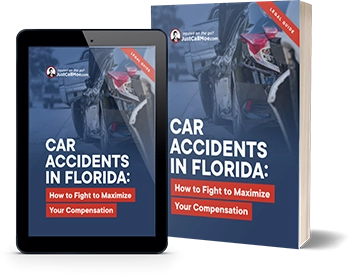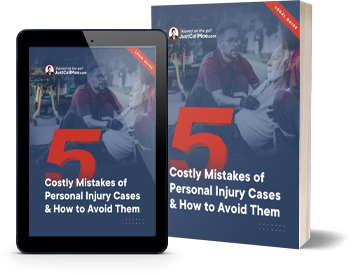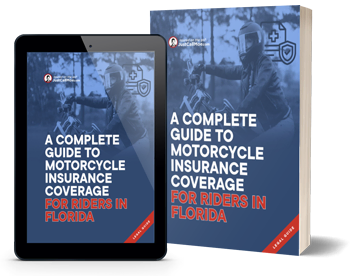Motorcycle riders have little protection in an accident, and even the most experienced motorcycle enthusiasts cannot predict or control the actions of others on the road. While wearing a motorcycle helmet substantially increases your chances of surviving a bike crash and walking away with minimal head and brain injuries, helmet use also affects your options when pursuing a personal injury claim.
At JustCallMoe, our Orlando motorcycle accident attorneys have a comprehensive understanding of Florida helmet laws and how wearing or neglecting to wear a helmet can impact the outcome of a personal injury case.
We also have considerable experience helping people who sustained injuries or lost loved ones in motorcycle wrecks seek recourse in the aftermath.
How Florida Helmet Laws Work
Florida’s sandy beaches, scenic highways, and ample tourist attractions make it a popular place to ride year-round, but many residents and visitors to the state have the same question: Does Florida have a helmet law?
The state does have a helmet law in place, but whether or not it applies to you depends on two key factors.
1. Your age
Anyone under 21 who operates a motorcycle within state lines must wear a motorcycle helmet. If you are over 21, Florida motorcycle helmet law does not mandate your helmet use, provided you carry the required insurance coverage.
2. Your insurance coverage
Per the Florida Department of Highway Safety and Motor Vehicles, the helmet law in Florida does not mandate helmet use for motorcyclists 21 and over if they have at least $10,000 in insurance coverage.
Florida laws also require motorcyclists to wear eye protection when riding bikes without windshields.
Wearing goggles or other protective eyewear is smart for all riders, as it can prevent damage caused by fierce winds or foreign objects such as rocks or insects.
If Florida’s laws require you to wear a helmet and authorities find you riding your bike without one, you may have to pay fines or complete a motorcycle safety course at the court’s discretion. While Florida helmet laws may not require you to wear a helmet, riding without one raises serious safety risks.
Depending on the circumstances, forgoing a motorcycle helmet can also jeopardize your ability to pursue a claim after your bike crash.
How Helmet Law in Florida Impacts Personal Injury Claims
Choosing to wear a motorcycle helmet or not can have a significant impact on the outcome of your personal injury claim.
Comparative negligence and helmet use
In Florida, comparative negligence principles apply to personal injury cases. This means the court system considers how much each party contributed to an accident when deciding the amount you can recover when seeking compensation after a crash.
Failing to wear a motorcycle helmet can directly impact how much you recover. The defense may be able to argue that you were negligent in your decision not to wear head protection and the serious injuries you experienced could have been prevented through helmet use.
Insurance coverage and helmet use
As previously noted, Florida motorcycle helmet laws require you to maintain certain levels of insurance coverage if you are over 21 and choose not to wear a helmet. If you fail to maintain adequate insurance coverage and get into a wreck without wearing a helmet, your lack of helmet use may weaken your ability to pursue a personal injury claim.
Traumatic brain injuries and helmet use
Failing to wear a helmet raises your risk of a traumatic brain injury (TBI). TBIs are among the most expensive injuries to treat, and many people who experience TBIs find themselves needing costly ongoing rehabilitation and care.
Neglecting to wear a motorcycle helmet can impact the damages you may receive, which, in turn, can affect your ability to obtain the treatment and care you need for a TBI.
How Florida Motorcycle Helmet Laws Help Protect Riders
By enforcing helmet laws, the state of Florida seeks to reduce the severity of TBIs and other serious head injuries sustained in motorcycle crashes. In addition to TBIs, many motorcyclists who forgo helmets sustain concussions, contusions, and skull fractures in bike crashes. Wearing a helmet helps absorb the initial impact of a crash and reduces the likelihood of head and brain injuries. This, in turn, reduces the chances of you or a loved one needing long-term care or rehabilitation after a motorcycle wreck.
While Florida helmet laws help protect you and other bike enthusiasts, they also enhance road safety statewide by encouraging responsible riding behavior and prompting bike enthusiasts to prioritize safety.
How To Leverage Our Knowledge of Florida Helmet Law
Florida helmet laws are complex and can significantly impact whether your motorcycle accident injury claim proves successful. At JustCallMoe in Orlando, Florida, we understand the intricacies of Florida motorcycle helmet laws and how they can influence the outcome of your case. Call us to schedule a consultation or speak to a member of our team.

 (866) 225-5663
(866) 225-5663




 100% Secure and Confidential
100% Secure and Confidential